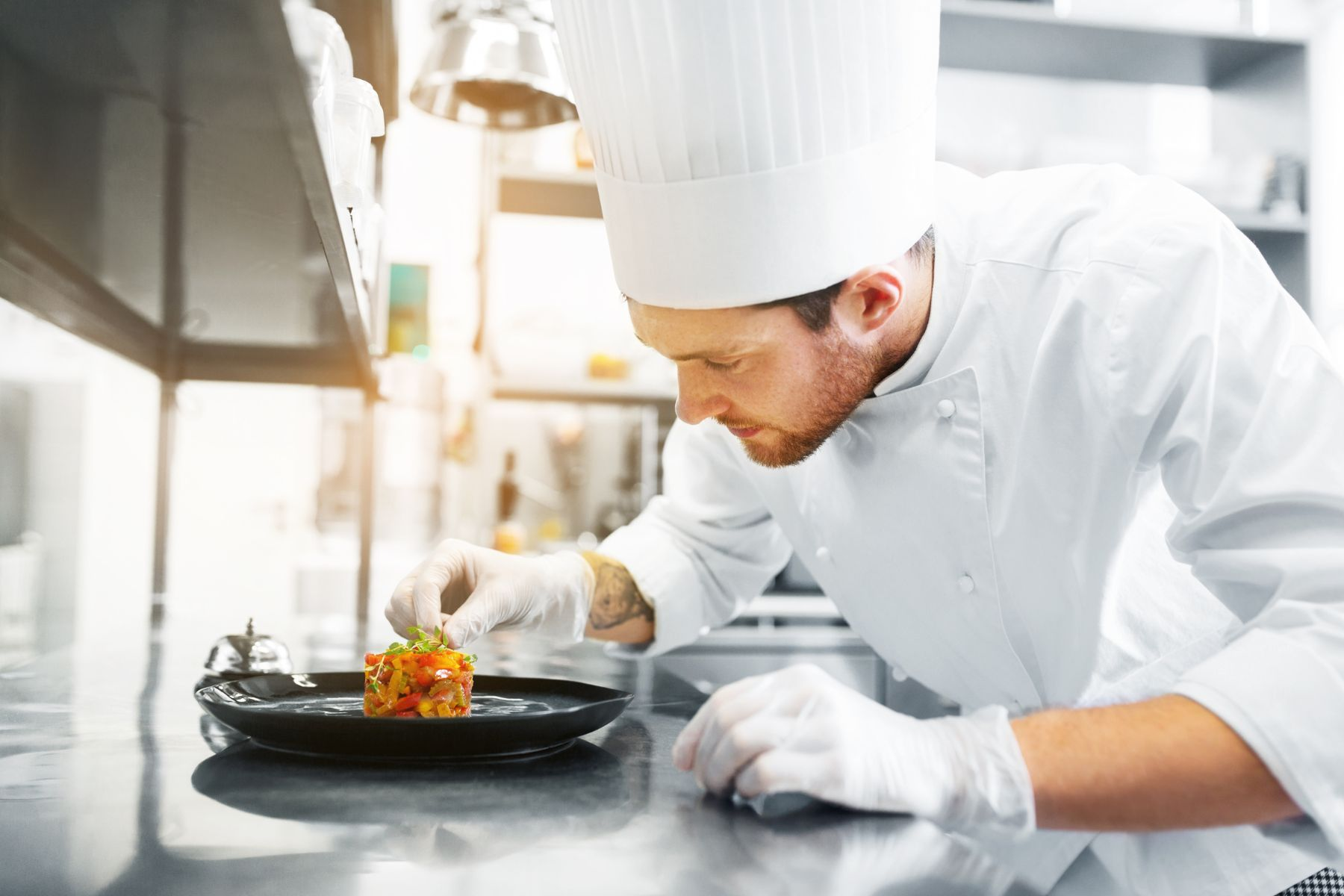The Complete Guide: Transitioning from Professional Cook to Master Chef
In the world of culinary arts, the journey from a professional cook to a master chef is a compelling and rewarding adventure. Whether you're just starting your career or aiming to climb the ranks, understanding the steps, roles, and considerations involved is crucial. In this comprehensive guide, we'll delve into the essentials of becoming a chef, exploring the nuances of the culinary industry, educational paths, and the various roles within the profession.
Starting a career as a chef is more than just mastering the art of food preparation; it's a dynamic journey that involves continuous learning, skill development, and a passion for culinary excellence.
What Does a Chef Do?

Exploring Roles: Differentiating Chefs vs. Cooks
Unlocking the secrets of the culinary world involves a fundamental exploration into the roles of chefs and cooks. Let's delve into the nuances, distinguishing the responsibilities that set chefs apart from their culinary counterparts, the cooks.
Chefs vs. Cooks: Deciphering Distinctions
While both chefs and cooks are integral to the culinary landscape, their roles differ significantly. Cooks primarily focus on the precise execution of food preparation, demonstrating technical proficiency in the kitchen. On the other hand, chefs orchestrate the entire culinary symphony. They are not only culinary maestros but also visionaries who shape menus, inspire creativity, and lead kitchen teams with finesse.
Understanding this dichotomy is pivotal as you embark on your journey, providing a compass to navigate the diverse responsibilities and skills essential for your evolution to a master chef.
The Chef's Path: Steps to Success

Becoming a chef is a multifaceted journey that involves a combination of education, hands-on experience, mentorship, and continuous professional development. Here, we'll break down each crucial step towards becoming a master chef..
1. Educational Foundation
-
Pursue a Degree or Diploma from an Accredited School
One of the first significant steps in your journey is acquiring a solid educational foundation. Enrolling in a reputable culinary school provides not only theoretical knowledge but also hands-on experience. Look for accredited institutions that offer comprehensive programs in culinary arts, covering essential skills from knife techniques to menu planning.
-
Credentials from Non-Accredited Institutions
While accredited institutions provide a structured and recognized path, some chefs have successfully entered the industry through non-traditional routes. Apprenticeships, mentorship programs, and self-directed learning can also contribute to a robust culinary education. However, be mindful of the need for practical experience to complement theoretical knowledge.
2. Training and Practice
-
Kitchen Hierarchy and the Brigade de Cuisine
Understanding the kitchen hierarchy is fundamental to your growth as a chef. The Brigade de Cuisine, a structured system of kitchen organization, outlines various roles such as the sous chef, chef de partie, and commis chef. Each role plays a crucial part in ensuring a smoothly functioning kitchen.
- How These Roles Work Together
Collaborative teamwork is the backbone of any professional kitchen. As you progress, familiarize yourself with how each role complements the others, creating a synchronized workflow. This knowledge will become invaluable as you step into leadership positions.
-
How Mentors Will Help You Grow
Mentorship is a cornerstone of success in the culinary world. Seek guidance from experienced chefs who can provide insights, share their experiences, and offer constructive feedback. Learning from those who have navigated the challenges of the industry will accelerate your development and contribute to your overall skill set.
3. Job Acquisition and Experience
-
Finding a Job as a Chef
Landing your first job as a chef requires a combination of networking, a well-crafted resume, and a demonstration of your culinary skills. Explore various opportunities in restaurants, hotels, catering, or even as a personal chef to gain diverse experience.
- Resources for Job-Seeking Chefs
Leverage online job boards, culinary associations, and networking events to discover job opportunities. Professional organizations like the American Culinary Federation often post job listings and offer valuable networking opportunities.
-
Working Your Way Up: Expectations and Growth
Starting as a line cook or a prep cook allows you to hone your skills while understanding the dynamics of a professional kitchen. Embrace each task with dedication, as it lays the foundation for your future roles. As you gain experience, take on more responsibilities and challenge yourself to learn new techniques and cuisines.
4. Ongoing Development

Importance of Industry Certifications
Continued education is crucial for a chef's success. Industry-recognized certifications, such as those from the American Culinary Federation, signify a commitment to excellence and can enhance your credibility in the culinary world.
American Culinary Federation Certification
Understanding the significance of certifications offered by organizations like the American Culinary Federation is vital. These certifications validate your skills and proficiency in specific culinary areas, bolstering your standing as a professional chef.
Certified Master Bakers and Certified Master Pastry Chefs®
For those inclined towards the artistry of pastry, pursuing specialized certifications such as Certified Master Bakers or Certified Master Pastry Chefs® can distinguish you in the competitive culinary landscape.
As you navigate these steps, remember that the culinary path is a journey of continuous learning and adaptation. Each step contributes to your growth as a chef, shaping you into a well-rounded and accomplished culinary professional.
Types of Chefs and Their Responsibilities

Diving into the various specializations within the culinary realm, from the visionary executive chef to the meticulous pastry chef, opens doors to diverse career paths. Understanding these roles ensures you align your aspirations with the right culinary niche.
Executive Chef
At the helm of the kitchen, the executive chef orchestrates the entire culinary operation. Their responsibilities encompass menu creation, kitchen management, and ensuring the seamless execution of culinary visions. Leadership, creativity, and a deep understanding of flavors characterize this pivotal role.
Sous Chef
As the second-in-command, the sous chef plays a crucial role in day-to-day kitchen operations. They coordinate tasks, manage staff, and step in for the executive chef as needed. Precision, multitasking, and adaptability are key attributes for success in this demanding position.
Pastry Chef
The pastry chef specializes in the sweet realm of culinary arts. Crafting delectable desserts, pastries, and confections, their work adds a touch of artistry to the dining experience. Attention to detail, precision in measurements, and a passion for baking define this role.
Chef Consultant
For those who relish variety, becoming a chef consultant offers the opportunity to lend expertise to various culinary projects. From advising on menu development to troubleshooting kitchen operations, a consultant's role is dynamic and diverse.
Personal Chef
A personal chef tailors culinary experiences to individuals or families. This role involves creating customized menus, preparing meals in private settings, and providing a personalized touch to dining. Flexibility, creativity, and strong interpersonal skills are paramount.
Private Chef
Serving a more exclusive clientele, a private chef brings gourmet dining directly into the homes of those seeking a bespoke culinary experience. This role requires culinary mastery, discretion, and the ability to cater to individual preferences.
Chef Owners
Venturing into entrepreneurship, some chefs become chef owners by establishing and managing their own restaurants. This role demands a combination of culinary expertise and business acumen. Chef owners leave an indelible mark on the culinary landscape, shaping both the menu and the overall dining experience.
Specialty Roles Chefs Oversee
Within the culinary hierarchy, specialized roles such as commis chef and chef de partie focus on specific aspects of food preparation. These roles require attention to detail, expertise in particular cuisines or techniques, and a commitment to culinary excellence.
What is a “Beginner Chef” Called?
The entry-level position in the culinary world is often referred to as a commis chef. This role marks the beginning of a chef's journey, where foundational skills are honed and culinary knowledge is expanded. As a beginner chef, one learns the ropes of the professional kitchen, setting the stage for future growth and expertise.
Considerations for Aspiring Chefs
Entering the culinary world as an aspiring chef involves more than just mastering culinary techniques; it requires thoughtful consideration of various factors that will shape your career. Here, we explore key considerations that will guide you on your journey from a professional cook to a master chef.
Job Considerations: Balancing Creativity, Sociability, and Scale

Creativity: Developing Menus, Plating Concepts, and More
As an aspiring chef, creativity is your secret ingredient. Beyond mastering recipes, chefs are tasked with crafting unique and appealing menus. Experiment with flavors, textures, and presentations to develop your signature style. Embrace the freedom to innovate, as it's often the mark of a distinguished chef.
Sociability: Your Desired Amount of Guest and Team Interaction
Consider your comfort level with social interactions. While some chefs thrive in open kitchens with direct customer engagement, others prefer the back-of-house focus on culinary craftsmanship. Assess your inclination toward team collaboration and guest interactions to align your career path with your preferred work environment.
Scale: Cooking for Dozens, Thousands, or One Person
Think about the scale of operations that excites you. Do you envision yourself managing a bustling restaurant kitchen, catering large events, or providing personalized culinary experiences as a personal chef? Understanding your preferred scale will guide your choices in terms of workplace and culinary specialization.
Cuisines: Specialization, Fusion, and More
Explore your passion for specific cuisines. Whether it's mastering the art of French cuisine, delving into exotic flavors, or creating innovative fusions, choosing a culinary direction adds depth to your expertise. Specializing in a particular cuisine can set you apart and attract a dedicated audience.
Location: One Single Community or Move Around the Country?
Consider your willingness to relocate. The culinary world offers opportunities across diverse locations, from small communities to bustling urban centers. Deciding whether you prefer stability in one place or the excitement of exploring different culinary scenes will impact your career choices.
The 7 Segments of the Culinary Industry

1. Lodging / Hospitality: Explore opportunities in hotels and resorts, where culinary excellence is often a focal point of the guest experience.
2. Catering: Delve into the world of catering, where you'll master the art of preparing and presenting meals for various events and occasions.
3. Restaurants: Restaurants offer a wide spectrum of experiences, from casual dining to fine dining establishments. Choose the setting that aligns with your culinary vision.
4. Retail Food: Consider roles in the retail sector, where culinary skills are valuable in areas such as product development, food styling, and more.
5. Leisure and Recreation: Explore culinary opportunities in settings like cruise ships, amusement parks, and recreational venues, where unique dining experiences are integral to the overall guest experience.
6. Institutional and Commercial Dining: Institutions, schools, and corporate dining facilities provide avenues for chefs to showcase their skills in large-scale meal preparation.
7. Food Manufacturer / Wholesaler: Delve into the world of food production, working with manufacturers and wholesalers to develop and enhance culinary products.
Understanding these segments allows you to tailor your career path based on your interests and preferences, ensuring a fulfilling and aligned culinary journey.
Education and Qualifications
The foundation of a successful culinary career often rests on a combination of formal education, hands-on experience, and a commitment to continuous learning. Here we explore education and qualifications, providing insights into choosing the right path and the types of culinary degrees available.
Choosing the Right Path

What Education is Required to Become a Chef?
Embarking on a culinary journey begins with education. While not mandatory, formal education equips aspiring chefs with a structured curriculum and a broad range of culinary skills. Culinary schools, community colleges, and universities offer programs that cover everything from fundamental cooking techniques to advanced culinary arts.
Benefits of Going Back to School
Returning to school for culinary education offers several advantages. It provides a focused and comprehensive curriculum designed by industry professionals. You gain exposure to diverse cuisines, techniques, and culinary trends. Additionally, culinary programs often include practical experience through internships or externships, giving you a taste of real-world kitchen dynamics.
Qualifications Needed
The culinary industry values a combination of education and experience. While formal education provides a strong foundation, practical experience in professional kitchens is equally essential. Aspiring chefs should seek a balance, actively participating in internships, apprenticeships, or entry-level positions while pursuing their culinary education.
Degree Options and Areas of Study
Types of Culinary Degrees and Other Credentials
Culinary education offers various degrees and credentials catering to different career aspirations.
-
Bachelor's Degrees: Comprehensive programs that delve deep into culinary arts, management, and hospitality. Ideal for those aspiring to leadership roles.
-
Associate Degrees: Two-year programs providing a solid foundation in culinary basics, suitable for entry-level positions.
-
Diplomas: Shorter, focused programs emphasizing specific culinary skills or cuisines. Ideal for those seeking rapid entry into the workforce.
Areas of Study for Chefs
Beyond choosing a degree, aspiring chefs can specialize in specific areas of study:
-
Culinary Arts: Focuses on fundamental cooking techniques, menu planning, and kitchen management.
-
Pastry Arts: Specializes in the art of baking and pastry, covering techniques in desserts, bread-making, and cake decoration.
-
Hospitality and Restaurant Operations Management: Ideal for those aspiring to manage restaurants, hotels, or culinary businesses.
In selecting a program and specialization, consider your career goals, personal interests, and desired level of culinary expertise.
Why You Should Obtain Ongoing Industry Certifications
American Culinary Federation Certification: What It Means and How to Get It
Industry certifications validate your proficiency and commitment to excellence. The American Culinary Federation (ACF) offers a range of certifications, each representing a specific level of expertise. Achieving ACF certification involves a combination of practical exams, written assessments, and documented work experience.
Certified Master Bakers and Certified Master Pastry Chefs®
For those passionate about baking and pastry arts, obtaining certifications such as Certified Master Bakers or Certified Master Pastry Chefs® adds prestige to your skill set. These certifications recognize advanced expertise in the specialized realm of baking and pastries.
Chef's Career Journey
As you progress in your culinary career, understanding the dynamics of the chef's career journey becomes paramount. Here we'll discuss the long-term growth opportunities, the hierarchical structure in professional kitchens, and the expectations for career advancement.
Long-Term Growth: Upward Mobility

Upward Mobility: Positioning Yourself for Promotion
The culinary world is dynamic, offering numerous opportunities for upward mobility. To advance in your career, actively seek out opportunities to take on more responsibilities. Showcase your leadership skills, initiative, and dedication to excellence. Consider pursuing specialized roles such as sous chef, executive chef, or even head chef as you gain experience.
Job Duties: Hands-on Food Preparation vs. Managing a Kitchen
As you ascend the ranks, your role may shift from hands-on food preparation to overseeing kitchen operations. Executive chefs and head chefs often focus on managerial aspects, including menu planning, budgeting, and team management. Balancing hands-on culinary expertise with effective kitchen management becomes crucial for sustained success.
Kitchen Hierarchy and the Brigade de Cuisine
How These Roles Work Together
Understanding the kitchen hierarchy, often referred to as the Brigade de Cuisine, is fundamental to navigating your career path. Each role within the brigade plays a specific part in ensuring a smoothly functioning kitchen. From the commis chef to the sous chef and eventually the executive chef, each position contributes to the overall success of the culinary team.
As an aspiring chef, familiarize yourself with the responsibilities associated with each role. Start by excelling in your current position, showcasing your skills, and expressing your interest in taking on more significant challenges.
How Mentors Will Help You Grow
Mentorship is a powerful catalyst for growth in the culinary world. Seek out experienced chefs who can provide guidance, share their insights, and offer constructive feedback. A mentor can provide invaluable advice on navigating challenges, refining your culinary skills, and making strategic career decisions.
Establishing a mentor-mentee relationship is a two-way street. Be receptive to feedback, actively seek opportunities to learn, and demonstrate your commitment to continuous improvement. A mentor can be a guiding light throughout your career journey, offering insights that textbooks and classrooms cannot provide.
FAQs on Becoming a Chef
Addressing common queries provides clarity for aspiring chefs.
1. How do you become a chef?
Becoming a chef involves a combination of education, practical experience, and dedication. Start by enrolling in a reputable culinary school or gaining hands-on experience in professional kitchens. Build a strong foundation in culinary techniques, work your way up from entry-level positions, and actively seek mentorship opportunities.
2. How much does a chef make?
Chef salaries vary based on factors such as experience, location, and the type of establishment. Entry-level positions like prep cooks may start with a modest salary, while experienced executive chefs in upscale restaurants can command higher salaries. Research salary ranges in your desired location and sector to set realistic expectations.
3. How long does it take to become a chef?
The timeline to become a chef varies. Culinary school programs typically range from a few months for diplomas to several years for bachelor's degrees. Gaining practical experience and advancing through kitchen roles can take additional years. It's a journey that combines education, hands-on training, and continuous learning.
4. How much does it cost to become a chef?
The cost of becoming a chef depends on factors such as the type of culinary program, location, and the duration of your education. Culinary school tuition can range from a few thousand to tens of thousands of dollars. Consider factors like living expenses, materials, and potential student loans when assessing the overall cost.
5. Are there culinary programs online?
Yes, many culinary schools offer online programs, allowing aspiring chefs to pursue their education remotely. Online programs provide flexibility, making it easier for individuals to balance work, family, or other commitments. However, ensure that the online program is accredited and includes practical components to develop hands-on skills.
Pro Tips and Insights
Becoming a chef is an exciting journey, and these pro tips and insights can help guide you along the way. Whether you're just starting or looking to elevate your culinary career, these practical tips offer valuable advice.
1. Passion for Cooking:
-
Love what you do. A genuine passion for cooking is the fuel that will keep you going, even on challenging days.
2. Creativity:
-
Don't be afraid to experiment and be creative with your dishes. It's the unique touches that set chefs apart.
3. Adaptability:
-
The culinary world is dynamic. Be open to learning new techniques, trying different cuisines, and adapting to changes in the kitchen.
4. Attention to Detail:
-
Little details matter in the kitchen. From precise measurements to perfect plating, attention to detail is a chef's secret ingredient.
5. Team Player:
-
Success in the kitchen is a team effort. Work well with others, communicate effectively, and be a supportive team player.
6. Resilience:
-
Expect challenges, and don't let setbacks discourage you. Resilience is key to overcoming obstacles in the fast-paced culinary environment.
7. Continuous Learning:
-
The culinary world evolves. Stay curious, seek new knowledge, and embrace lifelong learning to stay at the forefront of your craft.
Best and Worst Parts of the Job
1. Best Parts:
-
Creating Memorable Dishes: Bringing joy to people through your creations is incredibly rewarding.
-
Team Camaraderie: The shared victories and camaraderie in the kitchen create a unique work environment.
-
Personal Satisfaction: Seeing your hard work translate into delicious meals is personally fulfilling.
2. Worst Parts:
-
Long Hours: Kitchen life can involve long and demanding hours, especially during busy periods.
-
Physical Demands: The job can be physically demanding, requiring endurance and stamina.
-
Handling Pressure: The pressure to deliver high-quality dishes consistently can be stressful.
Conclusion
In closing, your culinary journey is a tapestry of experiences, skills, and flavors waiting to unfold. Cherish each moment, savor the lessons, and relish the joy that comes with creating something extraordinary. Whether you find yourself as an executive chef in a high-end restaurant, a pastry chef crafting delightful desserts, or a culinary entrepreneur owning your establishment, the culinary world welcomes your unique contribution.


